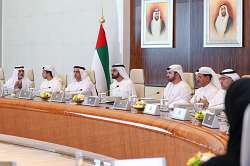Media Center
UAE Cabinet approves reduced electricity-consumption fees for industrial sector
The UAE Cabinet, chaired by His Highness Sheikh Mohammed bin Rashid Al Maktoum, the Vice President, Prime Minister and Ruler of Dubai, has adopted a resolution to support the industrial sector by introducing reduced fees of electricity consumption for large, medium and small factories.
"We launched today an initiative to support the industry sector and to affirm UAE’s position on the global map as an attractive investment destination that provides an integrated environment for growth and sustainability," said His Highness Sheikh Mohammed bin Rashid.
"We are investing in a sustainable industrial sector through the collaboration between different government entities and our goal is to be a successful model for the green economy to preserve our environment for future generations," His Highness added.
The initiative introduced a reduced tariff for electricity consumption for the industrial sector, to be in effect as of Q4 of this year, while achieving sustainable growth by reducing dependence on non-environmentally friendly sources such as liquid fuels.
Large factories will be supported by reducing the electricity consumption charges by 29%, while the small and medium factories will have reduced fees by 10 percent to 22 percent, in addition to waiving the service connection fees for new factories.
The Cabinet also approved the launch of the "one-day court" system to provide the fastest and most efficient services to the community. The "one-day court" will contribute to speeding up the ruling in minor criminal offenses. The initiative also affirms that the UAE is a state of institutions and law, possessing a distinguished judicial system that is based on modern mechanisms and systems.
The UAE Cabinet approved a law to provide special residency-visa privileges for expats retirees over the age of fifty-five years for a period of five years, with the possibility of renewal, according to specific conditions. The law, which will be in effect as of 2019, outlines the requirements to qualify for the long-term visa such as having an investment in a property worth AED2 million, or having financial savings of no less than AED1 million, or having an active income of no less than AED20,000 per month.
As part of the government's keenness to develop the human competencies across the federal government and to optimise human resources, the UAE Cabinet has approved the project of Succession Planning and Talents Pool in the federal government. The project aims to ensure that the Emirati manpower is equipped with the necessary tools to assume leadership and specialised positions.
The Cabinet adopted the unified national standards for public and private hospitals, which is in line with the UAE Vision 2021 to improve the level of services provided in the UAE in accordance to best standards and best international practices. The new unified standards provide guidelines for health care professionals and hospital design, as well as other standards for medicines, patients' rights, and patients’ families.
It also approved a resolution on the control and stamping requirements for trading in precious stones and precious metals to establish the necessary regulatory framework while preserving the high reputation of the UAE and increase its attractiveness to investments in this field.
The Cabinet approved an agreement between the UAE and the Government of the Russian Federation on the mutual exemption of visa requirements for citizens of both countries, and approved an agreement between the UAE and the Government of the Republic of Gabon regarding the establishment of an embassy to the Republic of Zimbabwe in Harare. The Cabinet approved the signing of an agreement between the UAE and the Government of the Republic of Cyprus on economic and technical cooperation, as well as a number of other agreements.


